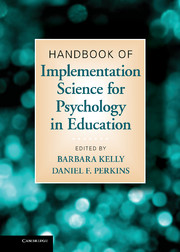Book contents
- Handbook of Implementation Science for Psychology in Education
- Handbook of Implementation Science for Psychology in Education
- Copyright page
- Dedication
- Contents
- Contributors
- Foreword
- Part I What is Implementation Science?
- Part II Statistical Problems, Approaches, and Solutions in Real-World Contexts
- Chapter 3 Developing Rigorous Programme Evaluation
- Chapter 4 Understanding the Nature of Experiments in Real-World Educational Contexts
- Chapter 5 Meta-Analysis of Implementation Practice Research
- Chapter 6 Using Evidence to Inform Practice in Science Teaching
- Part III Preparing for Effective Implementation:
- Part IV Successful Implementation of Specific Programmes and Interventions:
- Part V Improving the Implementation of Evidence-Based Programmes And Interventions via Staff Skills, Organisational Approaches, and Policy Development
- Part VI Signposts Toward Effectiveness
- Index
Chapter 3 - Developing Rigorous Programme Evaluation
from Part II - Statistical Problems, Approaches, and Solutions in Real-World Contexts
Published online by Cambridge University Press: 05 November 2012
- Handbook of Implementation Science for Psychology in Education
- Handbook of Implementation Science for Psychology in Education
- Copyright page
- Dedication
- Contents
- Contributors
- Foreword
- Part I What is Implementation Science?
- Part II Statistical Problems, Approaches, and Solutions in Real-World Contexts
- Chapter 3 Developing Rigorous Programme Evaluation
- Chapter 4 Understanding the Nature of Experiments in Real-World Educational Contexts
- Chapter 5 Meta-Analysis of Implementation Practice Research
- Chapter 6 Using Evidence to Inform Practice in Science Teaching
- Part III Preparing for Effective Implementation:
- Part IV Successful Implementation of Specific Programmes and Interventions:
- Part V Improving the Implementation of Evidence-Based Programmes And Interventions via Staff Skills, Organisational Approaches, and Policy Development
- Part VI Signposts Toward Effectiveness
- Index
Summary
- Type
- Chapter
- Information
- Publisher: Cambridge University PressPrint publication year: 2012
- 5
- Cited by

